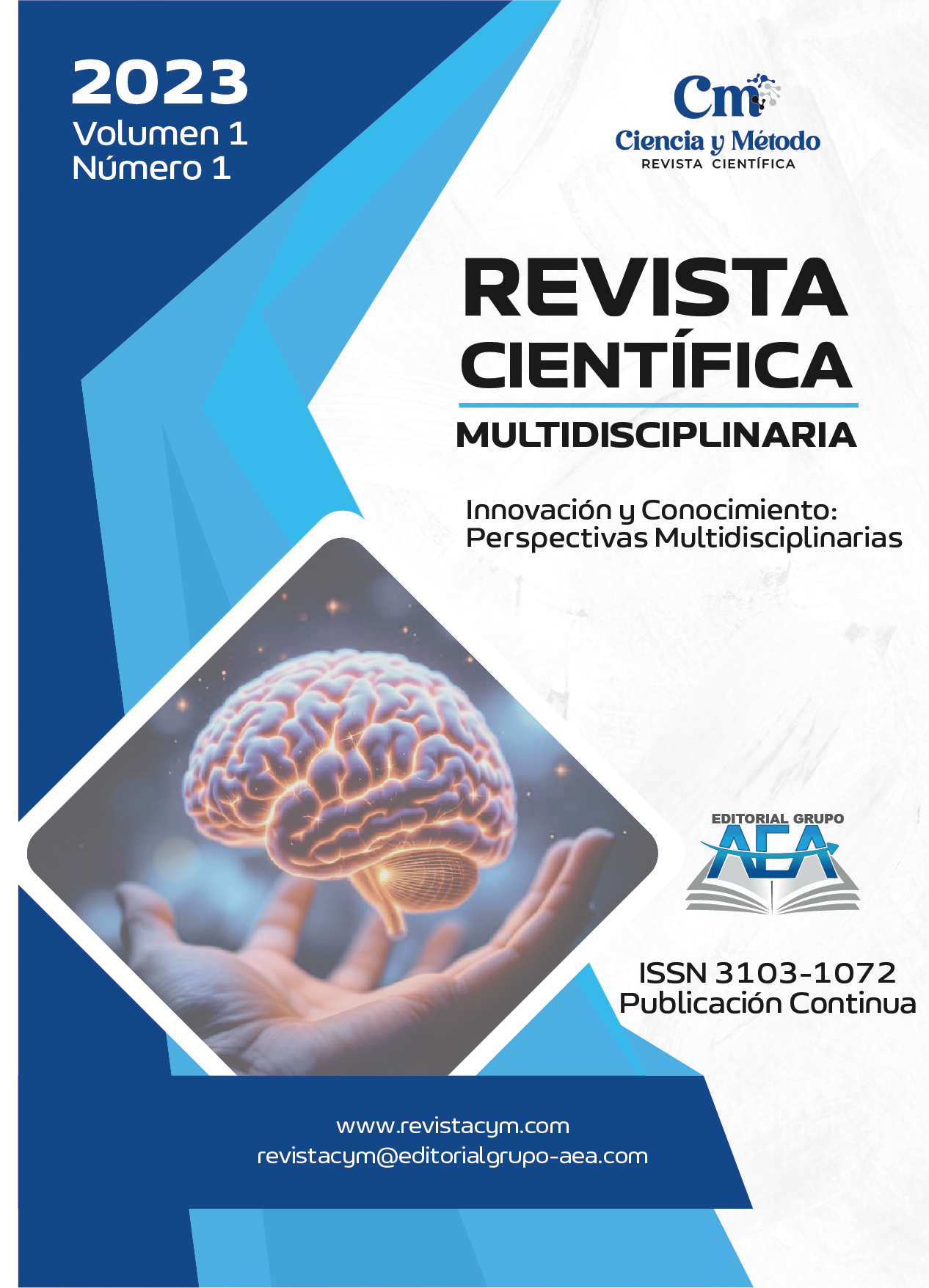Evaluation of the impact of emotional education on academic performance in adolescents
Main Article Content
Abstract
This literature review addresses the impact of emotional education on the academic performance of adolescents, based on the critical context represented by this stage in human development and the need to improve educational outcomes through socioemotional interventions. For this purpose, a systematic search and qualitative analysis of recent studies published in recognized databases was carried out, evaluating programs, emotional competencies and their effects on learning. The results show that the development of emotional competencies, such as self-regulation, empathy and social skills, improves concentration, motivation and reduces anxiety, favoring better academic performance and a positive school climate. Likewise, the implementation of structured emotional education programs in schools contributes to reduce disruptive behaviors and to enhance healthy interpersonal relationships, which strengthens the overall well-being of students. It is concluded that the continuous and systematic integration of emotional education in the school curriculum is fundamental to form resilient, emotionally competent adolescents capable of successfully facing the academic and social challenges of the 21st century.
Downloads
Article Details
Section

This work is licensed under a Creative Commons Attribution-NonCommercial 4.0 International License.
How to Cite
References
Brackett, M. A., Rivers, S. E., & Salovey, P. (2011). Emotional intelligence: Implications for personal, social, academic, and workplace success. Social and Personality Psychology Compass, 5(1), 88–103. https://doi.org/10.1111/j.1751-9004.2010.00334.x DOI: https://doi.org/10.1111/j.1751-9004.2010.00334.x
Denham, S. A., Bassett, H. H., Thayer, S. K., Mincic, M. S., Sirotkin, Y. S., & Zinsser, K. (2012). Observing preschoolers’ social-emotional behavior: Structure, foundations, and prediction of early school success. Journal of Genetic Psychology, 173(3), 246–278. https://doi.org/10.1080/00221325.2011.597457 DOI: https://doi.org/10.1080/00221325.2011.597457
Durlak, J. A., Weissberg, R. P., Dymnicki, A. B., Taylor, R. D., & Schellinger, K. B. (2011). The impact of enhancing students’ social and emotional learning: A meta‐analysis of school‐based universal interventions. Child Development, 82(1), 405–432. https://doi.org/10.1111/j.1467-8624.2010.01564.x DOI: https://doi.org/10.1111/j.1467-8624.2010.01564.x
Etkin, A., Büchel, C., & Gross, J. J. (2015). The neural bases of emotion regulation. Nature Reviews Neuroscience, 16(11), 693–700. https://doi.org/10.1038/nrn4044 DOI: https://doi.org/10.1038/nrn4044
Fathi, J., Saeidi, M., & Ghanizadeh, A. (2019). Emotion regulation and academic achievement: A meta-analysis. Educational Psychology Review, 31(4), 949–967. DOI: https://doi.org/10.1007/s10648-019-09484-2
García-Moya, I., & Moreno, C. (2015). Emotional intelligence in adolescence: Theory, assessment and academic performance. European Journal of Education and Psychology, 8(1), 5–14.
Greenberg, M. T., Domitrovich, C. E., Weissberg, R. P., & Durlak, J. A. (2017). Social and emotional learning as a public health approach to education. Future of Children, 27(1), 13–32. https://doi.org/10.1353/foc.2017.0001 DOI: https://doi.org/10.1353/foc.2017.0001
Gross, J. J., & Thompson, R. A. (2023). Emotion regulation: Conceptual foundations. In J. J. Gross (Ed.), Handbook of emotion regulation (3rd ed., pp. 3–24). Guilford Press.
Herrera-Enríquez, G., Herrera-Sánchez, M., Casanova-Villalba, C., Puyol-Cortez, J.,
Mendoza-Armijos, H, (2021). Manual para Elaboración del Plan de Titulación como Conclusión de Carrera. Editorial Grupo Compás.
Jennings, P. A., & Greenberg, M. T. (2009). The prosocial classroom: Teacher social and emotional competence in relation to student and classroom outcomes. Review of Educational Research, 79(1), 491–525. https://doi.org/10.3102/0034654308325693 DOI: https://doi.org/10.3102/0034654308325693
Loor Giler, J. L., Lorenzo Benítez, R., & Herrera Navas, C. D. (2021). Manual de actividades didácticas para el desarrollo de la comprensión lectora en estudiantes de subnivel de básica media. Journal of Economic and Social Science Research, 1(1), 15–37. https://doi.org/10.55813/gaea/jessr/v1/n1/18 DOI: https://doi.org/10.55813/gaea/jessr/v1/n1/18
MacCann, C., Fogarty, G. J., Zeidner, M., & Roberts, R. D. (2011). Coping mediates the relationship between emotional intelligence (EI) and academic achievement. Contemporary Educational Psychology, 36(1), 60–70. https://doi.org/10.1016/j.cedpsych.2010.11.002 DOI: https://doi.org/10.1016/j.cedpsych.2010.11.002
Madrid-Gómez, K. E., Herrera-Aponte, M. B., Arias-Huánuco, J. M., Zevallos-Parave, Y., Camposano-Córdova, A. I., & LLancari-Choccelahua, R. B. (2023). Interacciones Familiares y Autoestima: Un Estudio entre Estudiantes de Secundaria. Editorial Grupo AEA. https://doi.org/10.55813/egaea.l.2022.52 DOI: https://doi.org/10.55813/egaea.l.2022.52
Mayer, J. D., Caruso, D. R., & Salovey, P. (2016). The ability model of emotional intelligence: Principles and updates. Emotion Review, 8(4), 290–300. https://doi.org/10.1177/1754073916639667 DOI: https://doi.org/10.1177/1754073916639667
Mikolajczak, M., Roy, E., Luminet, O., Fillee, C., & de Timary, P. (2020). The moderating impact of emotional intelligence on the relation between stress and mental health. Personality and Individual Differences, 133, 17–23.
Parker, J. D. A., Summerfeldt, L. J., Hogan, M. J., & Majeski, S. A. (2004). Emotional intelligence and academic success: Examining the transition from high school to university. Personality and Individual Differences, 36(1), 163–172. https://doi.org/10.1016/S0191-8869(03)00076-X DOI: https://doi.org/10.1016/S0191-8869(03)00076-X
Pérez-González, J. C., Qualter, P., & Fernández-Berrocal, P. (2021). Emotional intelligence and academic performance in adolescence: A meta-analysis. Journal of Adolescence, 89, 114–126.
Puyol-Cortez, J. L., & Mina-Bone, S. G. (2022). Explorando el liderazgo de los profesores en la educación superior: un enfoque en la UTELVT Santo Domingo. Journal of Economic and Social Science Research, 2(2), 16–28. https://doi.org/10.55813/gaea/jessr/v2/n2/49 DOI: https://doi.org/10.55813/gaea/jessr/v2/n2/49
Schonert-Reichl, K. A., & Roeser, R. W. (2017). Social and emotional learning and teachers. The Future of Children, 27(1), 137–155. https://doi.org/10.1353/foc.2017.0008 DOI: https://doi.org/10.1353/foc.2017.0007
Silva Alvarado, J. C., & Herrera Navas, C. D. (2022). Estudio de Kahoot como recurso didáctico para innovar los procesos evaluativos pospandemia de básica superior de la Unidad Educativa Iberoamericano. Journal of Economic and Social Science Research, 2(4), 15–40. https://doi.org/10.55813/gaea/jessr/v2/n4/23 DOI: https://doi.org/10.55813/gaea/jessr/v2/n4/23
Taylor, R. D., Oberle, E., Durlak, J. A., & Weissberg, R. P. (2017). Promoting positive youth development through school-based social and emotional learning interventions: A meta-analysis of follow-up effects. Child Development, 88(4), 1156–1171. https://doi.org/10.1111/cdev.12864 DOI: https://doi.org/10.1111/cdev.12864
Terrazo-Luna, E. G., Riveros-Anccasi, D., Torres-Acevedo, C. L., Rojas-Quispe, A. E., Cencho Pari, A., Coronel-Capani, J., & Yaulilahua-Huacho, R. (2023). Habilidades Perceptivas: Mejorando el Aprendizaje Remoto en Estudiantes de 5 años. Editorial Grupo AEA. https://doi.org/10.55813/egaea.l.2022.30 DOI: https://doi.org/10.55813/egaea.l.2022.30
Wang, M. T., Degol, J. L., & Henry, D. A. (2019). An integrative development model of student engagement: A longitudinal study of adolescent classroom experiences. Child Development, 90(4), 1116–1134.





